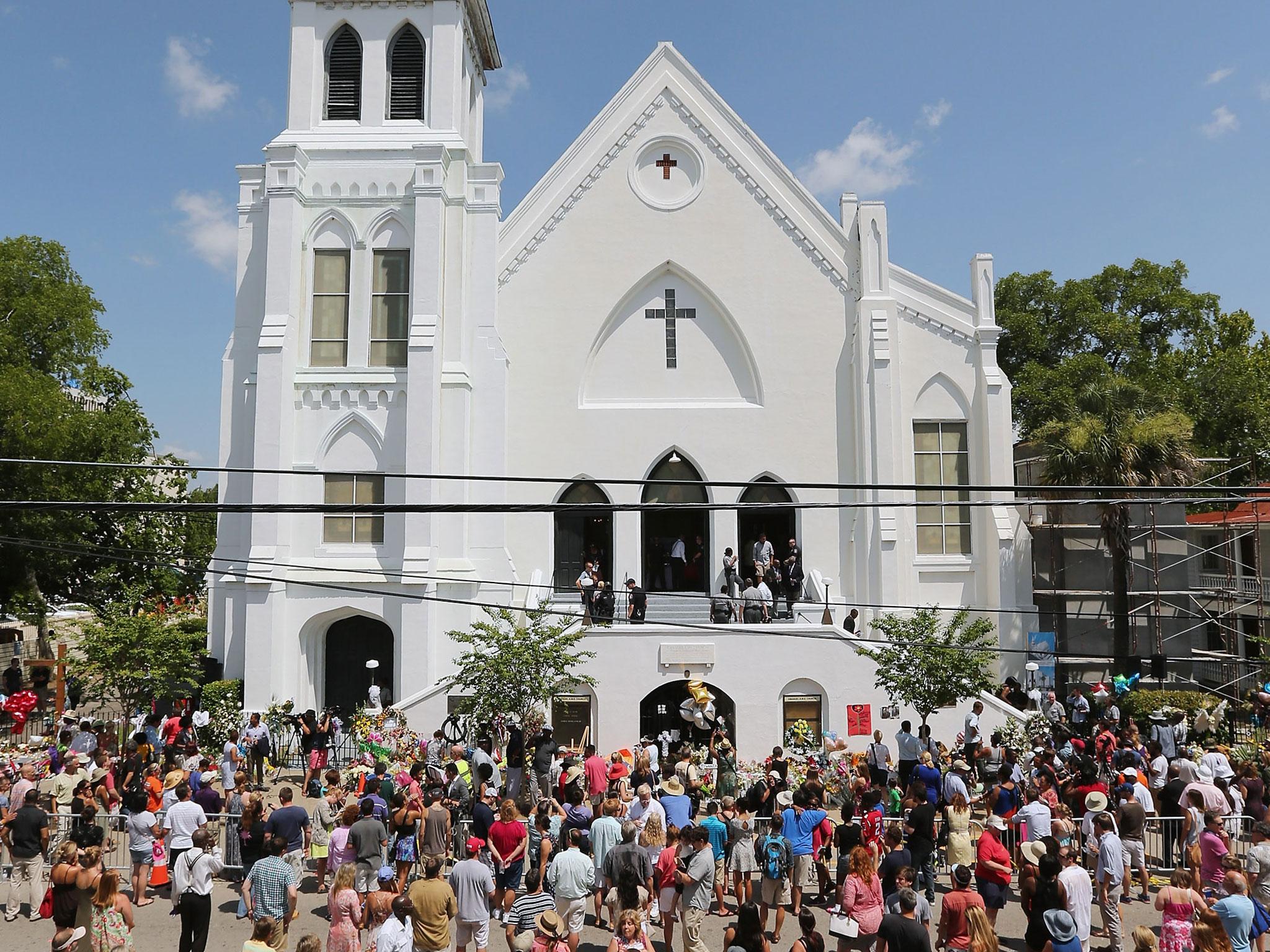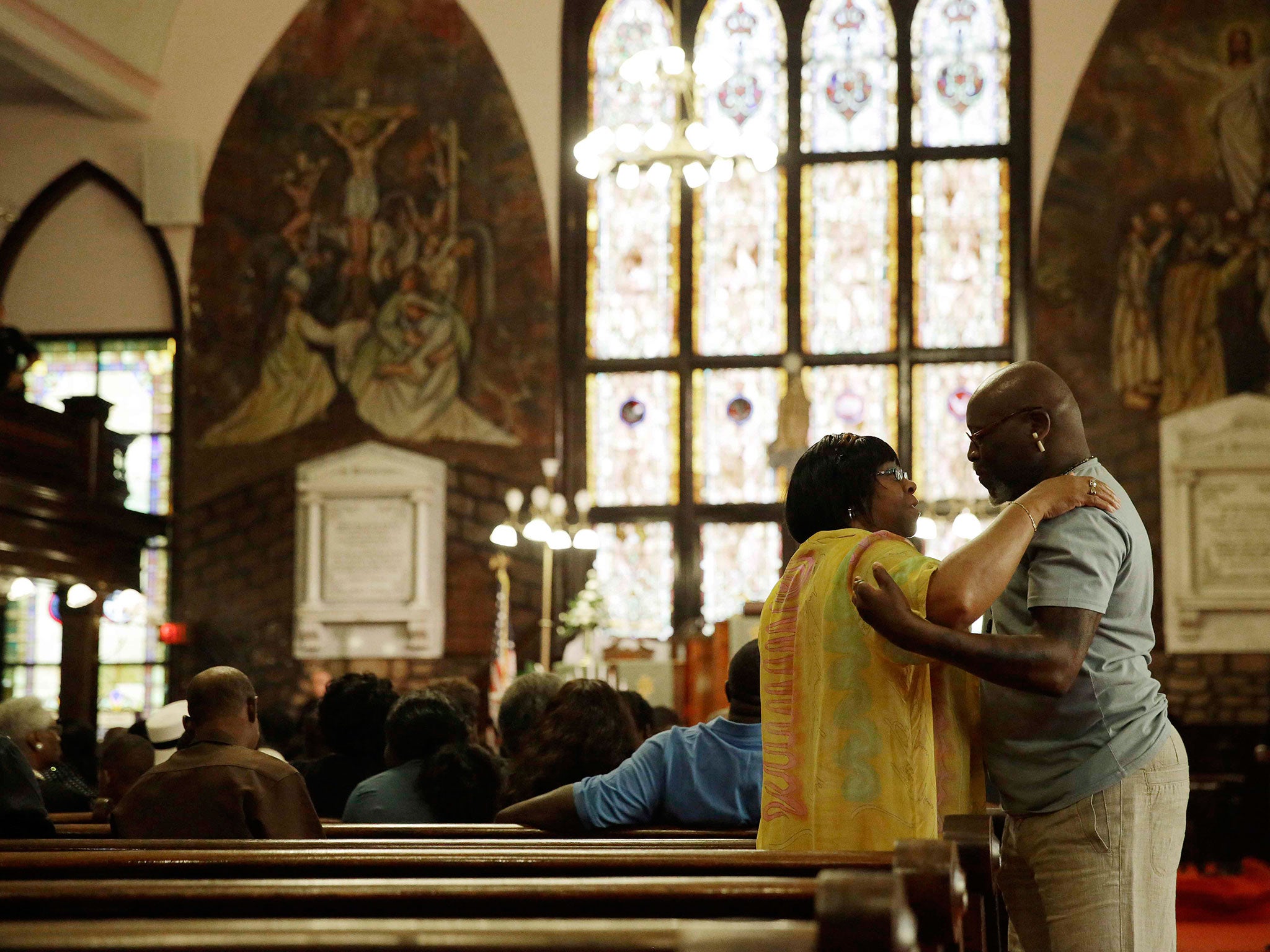Charleston shooting: Emanuel African Methodist Episcopal Church holds first service since killing of nine of its members
Community sends message it will come together in the aftermath of gunman's deadly attack

Half way up the blue-painted steps of the whitewashed church, the police announced there really was no more room inside.
It was always clear the historic building was not going to be able to accommodate everyone who wanted to attend Sunday’s service, and officials had set up loud-speakers outside in anticipation.
And so, on a morning when the southern sun broiled like a barbecue, hundreds of people stood in the street to join with those inside as Charleston’s Emanuel African Methodist Episcopal Church reopened with a service of defiance, dignity and no little passion.
“We are reminded this morning about the freshness of death that comes like a thief in the night,” declared the Reverend Norvel Goff, leading the two-hour service. “We realise there are dark days, but there are so many bright days.”

In the aftermath of the shooting dead of nine church members on Wednesday evening - the city at once reeling and the church turned into a crime scene under the control of police – the elders had been anxious to take back charge of the building and continue its services.
They believed doing so would not only help those grieving, but would send a message that the community would try and come together in the aftermath of the killings.
The church wanted its message to stand in stark contrast to that discovered in an online ‘manifesto’ suspected of belonging to Dylann Roof, the 21-year-old man charged with nine counts of murder, and which the Federal Bureau of Investigation is currently trying to authenticate. He is currently being held on suicide watch in the city’s detention centre.
Over the course of almost 2,500 words, Mr Roof, or whoever else wrote the text, outlined an alarmist, racist world view that defended segregation and sought to project themselves as someone defending the white and white supremacist community.
“I have no choice. I am not in the position to, alone, go into the ghetto and fight. I chose Charleston because it is most historic city in my state, and at one time had the highest ratio of blacks to Whites in the country,” it says.
“We have no skinheads, no real KKK, no one doing anything but talking on the internet. Well someone has to have the bravery to take it to the real world, and I guess that has to be me.”
It would be wrong to say the only response from African American people in Charleston has been one of forgiveness, most powerfully voiced by the relatives of the nine people who were killed, who spoke to Mr Roof via a video link in a courtroom and told him that forgave him for his alleged actions.
Indeed, there is great anger and frustration, both about the seemingly endless incidents of gun violence and an apparent unwillingness to address the strident racism that appears to have been at heart of Wednesday’s attack, carried out while the church held a bible study session in the basement. The church’s pastor, Clementa Pinckney, was among those who fell to the bullets after Mr Roof launched a racist diatribe.
Many have said that despite the advances, many in the south, and elsewhere in the country have failed to discard the racism that was once pervasive. They point to the Confederate flag – considered by black leaders to be a repugnant symbol of the past – that still flies outside the building of the South Carolina state legislature.
Reuters said that Cornell Brooks, who heads the National Association for the Advancement of Coloured People, told one television channel on Sunday morning: “That flag represents exclusion, it represents bigotry, it represents bias. It has to come down, it must come down.”
“People are frightened about talking about it. It’s racism and it’s covered up badly in America,” she said. “You don’t know who to trust.”
Nearby, one African American woman carried a sign that bore the words “there is no white Jesus”. She denounced others who told it was “not the right time” to be carrying such banners.
Inside the church, Mr Goff led the way through a service that was unabashedly Christian, unabashedly the sort of service that Mr Pinckney would have probably approved of.
After a series of roof-lifting hymns, Mr Goff announced that he was going to read from the Bible; he joked that if he saw people daring to nod off, he was going to start at the very beginning, “with Genesis”.
“It has been tough and rough and some of us have been downright angry. Now is a time for us to focus on the nine families. At this time we need to be in solidarity,” he said.
He added: “The blood of the Charleston Nine requires us to stay on the battlefield until there is no more fighting to be done.”
Outside, people held hands, hugged and bowed their heads. At 10am the bells in the four-storey church tower tolled, in unison with churches across the city. People prayed again when Mr Goff reminded them of the way that the church and community had responded, with hope rather than hate.
After the service, people swarmed out on the streets, many of them hot, most of them invigorated.
“There was an expectation that we would not come together as community, but we did,” said Rodny Riley, who had attended with his wife and two children. “Hate will never win.”
Join our commenting forum
Join thought-provoking conversations, follow other Independent readers and see their replies
Comments
Bookmark popover
Removed from bookmarks